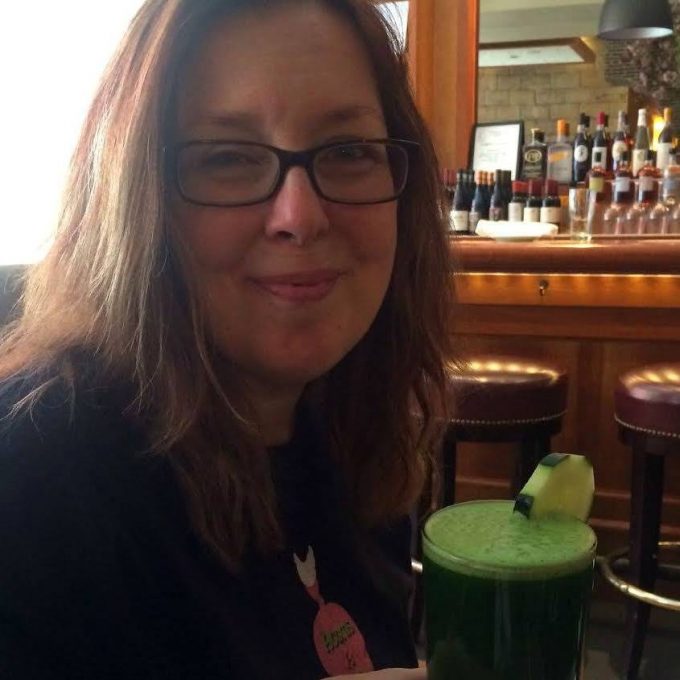When I went vegan back in 1988, my doctor at the time told me I was embarking on what sounded to him like a dangerous, fad diet and he advised against it. I had nightmares in which my teeth softened and fell out of my mouth due to lack of calcium intake (since I had stopped drinking milk). I was scared of how my health might suffer, but once I had learned the horrific truth about the vast majority of modern dairy farms—that female cows were forcibly impregnated and their male babies dragged off at birth to be imprisoned in veal crates—there was no going back. Even if all my teeth fell out and my bones crumbled, I wasn’t going to be a part of such cruel animal suffering. Such is the defiance of outraged youth.
Thankfully, all these years later my bones are strong and my teeth–while crooked due to a lost retainer that I never replaced–are still firmly implanted in my gums. My big, dramatic sacrifice turned out not to be a sacrifice at all. Veganism is now a part of our popular culture, with vegan food products deemed a “strong investment opportunity” and health professionals, including medical doctors and registered dieticians, affirming that thoughtfully planned vegan diets are nutritious and health promoting. Former president Bill Clinton even credits a vegan diet with potentially saving his life.
Surprisingly, some people still loudly and persistently proclaim that all vegan diets are harmful to human health. How do you respond to people who hold such strong, contrary viewpoints? You can reference the famous China Study and other research showing the potential benefits of healthful vegan diets, such as less inflammation associated with chronic disease, decreased risk of prostate cancer in men and better gut health. However, they will counter with research of their own. You can point out flaws in their research; in turn, they will point out flaws in yours. You can argue over the quality of each other’s studies, but have you ever tried to argue with someone who holds deeply felt religious or political beliefs that differ from your own? How did that go for you? My guess is that you didn’t make much headway in convincing the other person of the rightness of your position.
Before investing the time in attempting to change someone’s point of view, assess your likelihood of success and the impact that success might have on animals. For example, proponents of paleo-type and certain other animal-based diets fervently believe their chosen eating styles are superior, and they also condemn factory farming practices–in part, for being inhumane and destructive to the environment. They encourage the consumption of products from animals raised in less cruel conditions. At the same time, according to the 2016 Food and Health Survey, in the past year “significant numbers of Americans have changed their minds or behaviors around food and nutrition issues.” They sought out information and engaged with others about what they learned. Which group of people do you think is likely to be most receptive to your message? Which group’s change in behavior will result in the biggest impact for animals?
Whomever you decide to engage with, these resources can improve your chance of success in convincing them to try a more humane diet. This recent article in the Washington Post summarizes findings from a Cornell University study about how to change people’s minds. The Debunking Handbook explains how ill-informed attempts to debunk a myth can have the opposite effect of reinforcing it, and provides tips for successful debunking. There are a number of good books specifically about how to advocate effectively for animals. Faunalytics.org provides a wealth of research and information on effective animal advocacy. And former Vegan Outreach superstar Jon Camp offers these Tips for Civil Discourse.
Our perception of veganism has come a long way in the past 30 years. By being respectful in our approach and strategic with whom and how we choose to engage, we can persuade more hearts and minds to embrace this humane way of eating, and help more people become the kinder, healthier versions of themselves they already want to be.
 A nearly 30-year veteran of the animal welfare field, Vicki F. Stevens, VLCE, has led and contributed to a variety of programs at national animal protection organizations. In her spare time Vicki has earned a BA in women’s studies, an MS in nutrition and integrative health and has raised six cats (most formerly feral) to geriatric adulthood. Vegan since 1988, Vicki is unapologetically obsessed with the English Romantic poet Percy Bysshe Shelley and thinks Keats stinks. Visit Vicki on Twitter.
A nearly 30-year veteran of the animal welfare field, Vicki F. Stevens, VLCE, has led and contributed to a variety of programs at national animal protection organizations. In her spare time Vicki has earned a BA in women’s studies, an MS in nutrition and integrative health and has raised six cats (most formerly feral) to geriatric adulthood. Vegan since 1988, Vicki is unapologetically obsessed with the English Romantic poet Percy Bysshe Shelley and thinks Keats stinks. Visit Vicki on Twitter.

